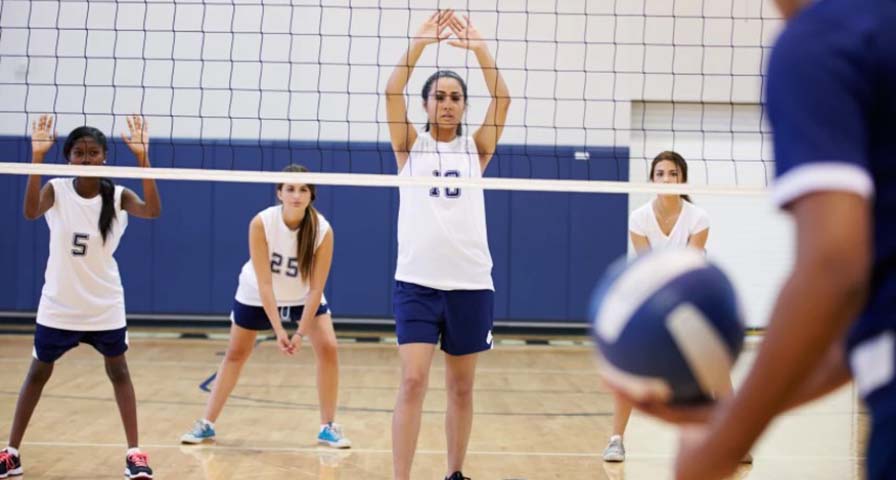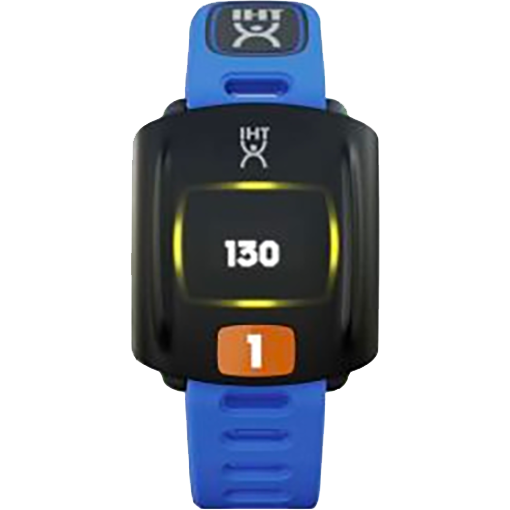Originally published Jan. 12, 2022 by Education Week.
By Sarah D. Sparks
Students at the Early College High School at Delaware State University are learning virtually through most of January, as the school tries to tamp down the latest pandemic outbreak. But for the school’s student athletes, the games will go on.
This week, members of the basketball and cheerleading teams returned to socially distanced practice and a few away games, sporting masks with their school mascot and carrying negative COVID-19 tests.
 The response is a far cry from the school’s universal lockdown during the pandemic wave that spiked last winter, even though omicron is significantly more infectious, albeit seemingly less severe, than the variants circulating at that earlier time.
The response is a far cry from the school’s universal lockdown during the pandemic wave that spiked last winter, even though omicron is significantly more infectious, albeit seemingly less severe, than the variants circulating at that earlier time.
“Last time taught us a lot. We were very scared, and everyone was afraid to touch anything or be near anyone. So we kind of shut it down. We shut school down, we shut academics down, we shut down athletics. But then, now that we know what we know, we know we can try to do it as safely as possible,” said Principal Evelyn Edney.
The Centers for Disease Control and Prevention, however, seems to suggest otherwise. According to the the CDC’s latest K-12 school guidance, many sports are considered “elevated risk” activities because they can involve shouting, vigorous exercise that leads to strong or forceful breathing, and close physical contact among student athletes and trainers, particularly indoors.
For sports in general, the CDC recommends schools like Edney’s implement COVID-19 testing for students and adults in the 24 hours before practice or competitions. But the guidance also warns, “High-risk sports and extracurricular activities should be virtual or canceled in areas of high community transmission unless all participants are fully vaccinated.”
In the wake of the highly transmissible omicron and delta variants, nearly every county and district in the country is experiencing high community transmission, particularly among school-age children.
The call to limit sports “is intended to really protect that critical in-person learning time,” said Dr. Rochelle Walensky, the CDC’s director, in a briefing last week on the new variants. “That is really one piece of a layered prevention strategy that schools can use.”
Yet schools nationwide have taken a wide array of approaches in the last few weeks. While Los Angeles Unified schools canceled all sports for at least the week of Jan. 10, and New Jersey’s health department called for schools to bar any unvaccinated student athletes from participating in sports, many districts are trying to keep students playing.
“It’s funny, last year I didn’t let my teens play,” Edney said. “I just felt like if we were going to not be in school academically, why am I bringing in sports? … I was fighting for my school, and it was my responsibility if anybody got sick. So we stayed home for almost a year.
“But this year we’re back,” she continued, “we’re just temporarily doing to let things calm down a little bit and then we’ll be back. So I didn’t want to lose the continuity this year, and we knew how we could use those mitigation strategies to keep things pretty safe in school.”
Juneau, Alaska, schools do not require vaccination, but students who do so are allowed to opt out of the COVID-19 testing otherwise required to participate. The district requires masks and testing for all athletes and coaches and has started to make rapid-result COVID-19 tests available to teams coming in from other schools.
Like Edney, Juneau Superintendent Bridget Weiss said she decided the social-emotional benefits students got from sports outweighed the risks of infection.
“What we have learned as a result of a complete shutdown is that activities play such a critical role in the development and education of our children,” Weiss said. “The social and emotional development and engagement in learning was deeply impacted when activities stopped in the spring of 2020. Last year and this year, we have continuously grown in our ability to sustain activities even when conditions worsen.”
Karissa Niehoff, the chief executive officer of the National Federation of High School Associations, said unlike last school year, none of the 51 state associations for high school sports has delayed their schedules this year, but illness and quarantines have caused problems for individual school districts.
In Delaware, Early College High School does not require students to be vaccinated in order to play. So far, Edney said, students and parents have complied with mask and testing requirements. Some of the strongest pushback has come instead when the school has limited or stopped family and fans from coming to watch games from the stands. Both the Early College and Juneau schools have started streaming games online to help spectators keep up with games they can’t attend.
Pottsgrove High School also requires masks and COVID-19 testing, but the recent spike in coronavirus cases is already interrupting games in Pennsylvania, according to Principal Bill Ziegler, who also serves as the district’s athletic-association president. In one week, 3 of 5 games had to be delayed or canceled due to COVID-19-related issues.
“We’re constantly flexing out games, changing the times and moving them to a different day. We just recently had to postpone an athletic event due to no referees being available,” he said. “We were seeing right before the holidays, but now—now it seems like it’s affecting just as much the athletes as it is coaches and referees … especially in our smaller schools.”
Boost Student Wellness with the IHT ZONE heart rate monitor:




